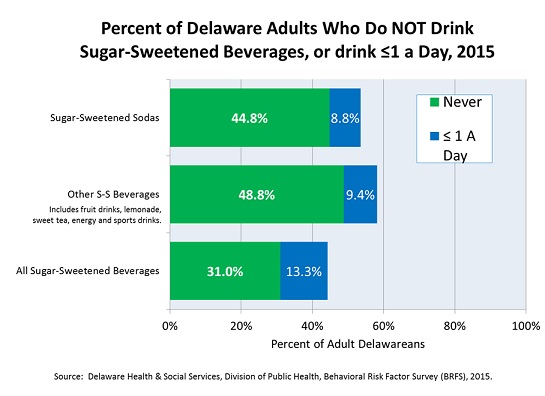Delaware Adults Still Not Eating
Recommended Amounts of Fruits and Veggies
Recommended Amounts of Fruits and Veggies
Current Suspected Overdose Deaths in Delaware for 2024: Get Help Now!
Find school water testing results and additional resources
Attention Medicaid Participants: Eligibility Renewals Restarted April 1, 2023
Survey research often uses consumption of fruits and vegetables as an indicator of a healthy diet. The Dietary Guidelines for Americans recommends that half of one's average meal should consist of a variety of vegetables and fruits. When that guideline is followed, the meal may be less likely to include a lot of foods high in saturated fats and/or sugars and refined carbohydrates. The Behavioral Risk Factor Survey (BRFS) asks questions about vegetable and fruit consumption in odd-numbered years.
![]() One frequent suggestion is that adults should try to eat at least five vegetables and fruits every day. In 2015, what was the prevalence for consuming any variation of five fruits and/or vegetables a day?
One frequent suggestion is that adults should try to eat at least five vegetables and fruits every day. In 2015, what was the prevalence for consuming any variation of five fruits and/or vegetables a day?
Prevalence is much higher for smaller quantities of fruits and vegetables: 79.3 percent of adults report one or more vegetable per day, and 61.8% eat 1 or more fruits a day.
Sugar-sweetened beverages — including sodas, fruit drinks, lemonade, sweet tea, and energy drinks — are high in calories and contain almost no nutrients. Therefore, they can contribute to weight gain, and development of pre-diabetes. People with diabetes should not drink anything which is sugar-sweetened.
In 2015, the BRFS also asked questions about how many sugar-sweetened beverages respondents consume. About 31 percent of all adults in the survey reported they do not drink any sugar-sweetened beverages. Another 13.3 percent said they consume these high-sugar drinks less than once a day (see graph below for results).
